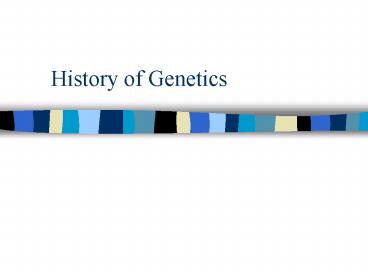History of Genetics
1 / 41
Title: History of Genetics
1
History of Genetics
2
The Beginning
1859 Darwin publishes the Origin of the
Species Stating that members Of a population
that are Better adapted live longer And pass on
their traits. Nothing has been proposed About
how these traits are Passed on.
3
1866 Gregor Mendels Publishes
- Law of Inheritance
- Based upon experiments started in 1857 on pea
plants - Ignored until 1900, well after his death in 1884
4
1969 DNA nuclein first recognized
- Identified by Freidrich Miescher and an acidic
substance found in the nucleus. - Not appreciated for 70 years
5
1900 Mendel Rediscovered
- Confirmed by 3 different researchers
- Translated by William Bateson into English the
the study of heredity begins
6
1902 lst human disease attributed to genetic
causes.
- Sir Archibald Garrod identified alkaptonuria
7
1902 Chromosomes come in pairs
- American biologist Walter Sutton demonstrated
that chromosomes came in pairs and were alike in
structure
8
1905 Genetics is used for first time
- Coined by William Bateson in a personal letter to
Alan Sedgwick on April 18, 1905
9
1905 Some genes are linked
- They dont show independent assortment as
described by Bateson and Punnett. - Punnett developed the Punnett square to look at
probability in genetic choices.
10
1910-11 Chromosome Theory of heredity is confirmed
- T.H. Morgans experiments fruit fly eye color
confirm this.
11
1913 1st Linkage Map
- Created by Columbia undergraduate Alfred
Sturtevant working ith T.H. Morgan - Linking traits to gene on chromosomes.
12
1910-1930 Eugenics
- Social philosophy which advocates the improvement
of human hereditary traits through various forms
of intervention
13
Eugenics used for Sterilization Laws
- 1907 First law in Connecticut
- 1914 Harry Laughlin published the Model Eugenical
Sterilization Law - Sterilize socially inadequate people in
institutions
14
(No Transcript)
15
(No Transcript)
16
Sterilization Laws Purpose
- Clearly, these laws were meant to keep
"defective" individuals from reproducing amongst
themselves and, thus, reduce the burden of
"social dependents" who had to be supported in
state institutions. - Less clear, perhaps, was the intent to prevent
mildly retarded people from reproducing with
normal people, and thus, contaminate good genetic
stock.
17
Sterilization Purpose
- This fear was generated by Henry H. Goddard's
study of Martin Kallikak (1912), a normal man who
sired a "defective" line after having an illicit
affair with an attractive, but "feebleminded"
girl. This was analogous to the fear of a mixed
race person who might "pass for White.
18
Sterilization
- In Skinner vs. Oklahoma (1942), the Supreme Court
struck down a law allowing the involuntary
sterilization of criminals. However, the Court
never prohibited states from sterilizing
non-criminals, despite later scholarship showing
the falsity of eugenic "evidence" used in Buck
vs. Bell. - Sterilization of the allegedly mentally ill
continued into the 1970s in several states, by
which time about 60,000 Americans had been
involuntarily sterilized
19
Task
- Go to Eugenics archive at
- http//www.eugenicsarchive.org/eugenics/list3.pl
- Investigate one of the aspects of Eugenics. Write
a paragraph outlining what you learned and a
paragraph on what you think of this use of
genetics.
20
1928 Heat killed virulent bacteria can
transform non-virulent bacteria.
- There must be a genetic transfer.
21
1931 Genetic recombination
- Caused by a physical exchange of chromosome
pieces. - Harriet Creighton Barbara McClintock in corn
22
1941 One gene encodes one protein (1958 Nobel
prize)
- Beadle Tatum
23
1944 DNA mediates heredity
- Avery, MacLeod McCarty
- Most didnt believe until 1952
24
1950 Chemical Components of DNA
- Amounts are equal of A T C G
- By Erwin Chargaff
- Austrian who emigrated to US in 1935
25
1953 DNA Double Helix
- Watson, Crick, Wilkins Rosalind Franklin
26
1955 human chromosomes46
- Joe Hin Tjio
27
1959 mRNA intermediate between DNA protein
- Sydney Brenner
- Matthew Meselson
- Francois Jacob
28
1966 Each aa coded for by codon
- Marshall Nierenberg
- H. Gobind Khorana
29
1977 DNA sequencing Technology
- Fred Sanger
30
1978 RFLPS discovered
- Restriction Fragment Length Polymorphisms
- Found throughout the genome are a ! Markers in
genetic studies - David Botstein
31
1983 PCR developed
- Polymerase chain reaction making lots of copies
of DNA sequences - Kary Mullis
32
1983 Gene for Human disease is mapped -
Huntingtons
- Gene responsible for the disease is on the short
arm of chromosome 4
33
1984 DNA Fingerprinting
- Sir Alec Jeffreys
34
1989 Natl. Center for Human Genome Research
created
- 3 Billion US effort headed by James Watson
35
1990 The Human Genome Project
- International effort to sequence all DNA and map
all the genes in humans is launched.
36
1992 Map genetic markers on 23 chromosomes
- Daniel Cohen
37
1994 High-density Map of Human Genome published
- 6000 markers identifying genes for Bipolar
disorder, hearing loss, dyslexia, thyroid cancer,
sudden death syndrome, and dwarfism
38
1995 Full genome on bacteria
- Hemophilus influenzae
- Bakers yeast
- 12 million pairs of DNA
39
1999 SNP consortium
- Single nucleotide polymorphisms (SNPs) -the most
common form of genetic variation.
40
2000 Rough Draft of Human Genome is Completed
- Goals to discover all 30,000-40,000 human genes
and make them accessible for further study
41
2001 Private Company clones human embryos
- Advanced Cell Technology - private U.S. company
announced it cloned embryos































